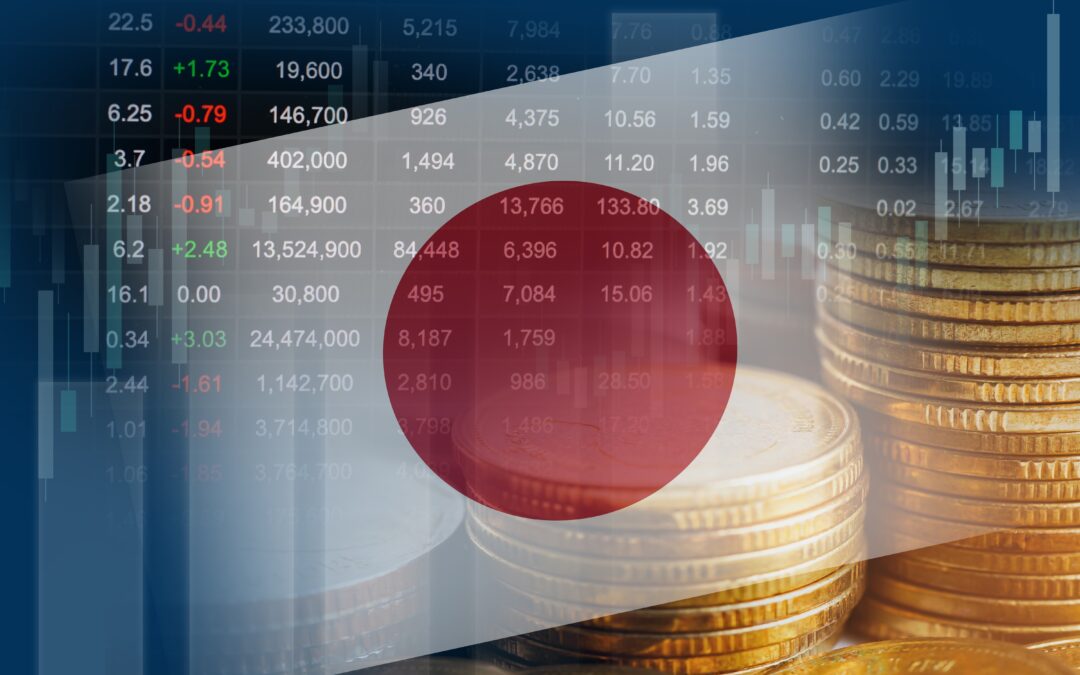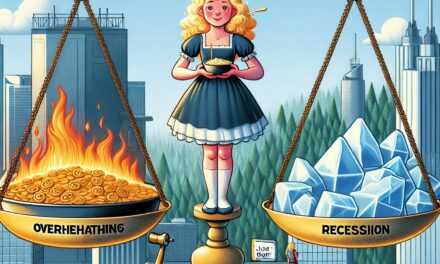I spent four-and-a-half very impressionable years of my youth living in Japan.
Not just as a tourist either … I served as a Research Fellow at the Kyoto University Economic Research Institute.
It was amazing to be plugged into a whole new culture, whole new economy, and whole new way of thinking — all while struggling to learn the language.
So it was a special event when I had the chance to return to Japan with my family for a two-week vacation earlier this year.
I was pleased to find that so many wonderful things about the country hadn’t changed over the last 30 years. But I couldn’t help noticing what had changed.
Click below to roll this week’s episode and see what I mean:
&
Video transcript:
Welcome to Moneyball Economics. I’m Andrew Zatlin.
It’s been a few weeks since I got back from my trip to Japan, and during that time I’ve had a chance to reflect on both the trip I took and on Japan as an economic entity where they are today and where they’re going. I’d love to share some of these reflections with you…
First off, the trip I took two weeks with my family was intended to showcase Japan, the culture, the sites. I was able to draw upon my four, four and a half years of living, working in Japan. So back in the eighties and nineties, I lived, studied and worked in Tokyo, Kyoto, and even a couple years in a place called Kagoshima. So I was able to craft what I hoped was the perfect trip.
An opportunity for, well, not immersion, but at least to get off the beaten path, to see things most people wouldn’t see and experience things most people wouldn’t see. To get a real taste of Japan, and I think it worked out.
I mean, we had a great time, according to my family, and I had a great time.
We get there, jet lagged the first morning, it’s 4:30 in the morning, so I took my son. We hopped a cab. We went to the Tokyo Tsukiji Fish Market, the world’s largest fish market. We got to see them auctioning off these huge tuna, and at six in the morning when we were done, we went around the corner, went to a Michelin starred sushi restaurant where I ate some of the best sushi I’ve ever had, and trust me, I’ve had a lot of sushi.
I mean, we really got into things that you wouldn’t see on your typical guided tour, and in that way, I was able to show a lot of the sight and the sounds we ate well.
We did things. For example, day one, we’re going to be in Japan for two weeks. We’re going to be using chopsticks. I don’t want to use just ordinary chopsticks. I took us to a place where we could pick the wood, plain it down, boom. We have our own chopsticks in Japan, so we had great time. We did the traditional stuff like tea ceremonies, maybe the less traditional stuff, like taking in a baseball game at the Tokyo Dome, buying a hat. We had a great time looking back.
They say you can never go back. It’s been 30 plus years since I lived in Japan in that time. Things have changed, the architecture, more buildings and stuff. But you know what? It felt like nothing has changed dramatically in 30 plus years.
The culture, the people, it was great to get on a train, for example, and it was quiet. You didn’t have people yapping on their phones or listening to music. Things I love about Japan, the harmony with nature, the people super friendly.
We had so much good time with the Japanese people. Again, I speak enough of the language where we could get around and have great conversations.
There was one thing that was different…
When I say all this stuff was basically the same and that I had a great time, one thing was different and it really sets the tone for what I want to talk about when it comes to the economy. There were a lot of foreigners, and when I say a lot, I mean a lot.
When I was in Japan in the eighties and nineties, if you bumped into another foreigner, it was probably just going to happen in Tokyo, not this time. Everywhere I went, there were foreigners, and I mean people from, you could tell from Malaysia, Indonesia, India, Europe, America.
I mean there were tons of people from all over the world. Japan has become an international destination, which is kind of odd because when you think geographically, Japan is at the other end of the entire world, nevertheless, they’re a big destination and that makes sense.
They’ve got all this ancient culture, all these things to see. It’s incredibly safe. The Japanese people incredibly friendly and hospitable. They even speak a lot of English, so a very great place to go and have a good time. Climate, geography, all hospitable.
But when we talk about tourists, what’s interesting is back about 15 years ago, maybe 10 million people visited Japan today, 40 million. So it’s boomed and it’s starting to have an impact on Japan. Japan, well, economically, they’re not doing well.
In fact, Japan is a fading glory. They are literally an economy in slow decline. It’s almost like seeing Spain or France not too long after their empire ended and then they started to decline.
Japan is similarly living off the wealth they built up as a manufacturing center in the eighties, but since that time, they’ve been slowly, slowly, slowly deteriorating in economic strength. For example, tourism a couple of years ago, tourism was less than 0.3% of their GDP.
Now, you look at something like France, it’s two and a half percent. The French depend on tourists, and in fact, tourists go to France, they go to Italy for the same reasons they go to Japan. Again, to experience both the culture as well as to take in the sites, these examples of faded imperial glory.
Where does Japan go next? Well, when we talk about tourism, another interesting thing is population foreigners coming to Japan don’t only come as tourists. A lot of them are sticking around, and that may or may not be a good thing for Japan because Japan’s a little bit special.
Like these other countries I’ve mentioned, we have a demographic implosion.
Japan’s population peaked a couple of years back at 128 million. They’re now down to 123 million. So at the same time, we’ve got a slow decline in the economy. The Japanese GDP has been shrinking steadily there, no, no longer manufacturing powerhouse. They export maybe not quite a trillion dollars of stuff. Their economy is 70% consumer and services driven. They’re slowing down and the population is shrinking.
That’s kind of a problem because your working population is shrinking. That means wealth creation is shrinking, and Japan happens to be very top heavy with old people. These are people who are going to be drawing on resources more than boosting creation.
So Japan passed an inflection point. They’re shrinking. I’m trying to address that with incentives to boost the birth rate, but when you get right down to it, they’re not following yet.
The ways that we saw in Europe where you solved your demographic shrinking by bringing in a population, the US does the same thing. We have a lot of immigration, Japan, they don’t have out-migration, but they’re starting to experience some immigration.
Now, this is a challenge because you think of Europe, you think of the United States. These are relatively multicultural places. You think of Japan, they’re not multicultural, they’re fairly homogenous. And then you bring in people from another world. Well, to what degree do they integrate and to what degree do they influence the Japanese culture?
30 years for me, since I lived in Japan and Japan still felt the same. I can’t say that’s going to be the same 30 years from now. Why? Well, I’ll give you a classic example. In America, we have a very strong and pervasive tipping culture. The idea now isn’t we’re going to tip because of some going above and beyond type of service.
We tip on anything.
Now, I can go to Starbucks, pull something out of the case, hand it over to pay, and I’m expected to give a 20% tip because someone rang me up. I bet not too long from now, I’m going to go to the doctor’s office, hand ’em my credit card for my copay, and they’re going to have a tip line on the thing.
We tip for various reasons in the United States, but Japan doesn’t. They have a culture of working hard. They have a culture in which you’re supposed to do your job and do it well, and you shouldn’t expect extra for doing your job correctly. That’s different from the United States.
And at the same time, I started to see some tipping culture take over. Some places started to have a tip jar or started to ask for tips. I started to see beggars on the streets, the kind of folks I might see in Europe, sitting there with an open guitar case while they kind of tried to strum the guitar.
So what we have is a problem for Japan.
On the one hand, they need people. They need people to keep their economy going. On the other hand, you bring in people from outside your culture and outside your geography. They’re bound to bring in new and different ways, and it’s not clear that Japan is either ready for that or if they welcome those changes.
But hey, the world moves on, and so hopefully Japan will figure this out. In the meantime, I strongly recommend Japan as a tourist destination. I strongly recommend Japan as a place to go and enjoy your time, and I hope Japan is going to pull itself out of this slow spiral. But you know what? I don’t think they will. And so if it were me, I would not be investing in anything Japanese. Take care of folks. We’re in it to win it.
Zatlin out.

Andrew Zatlin
Editor, Moneyball Economics
To learn more about his forecasting track record and analysis style, visit the official page for Andrew Zatlin reviews and insights.





